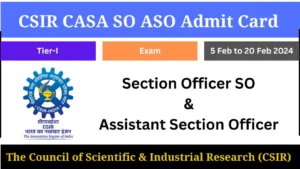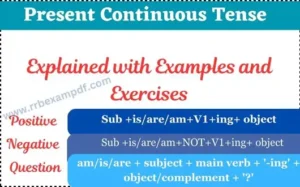present perfect tense with examples: The Present Perfect tense is a crucial aspect of English grammar that allows us to describe past actions with a connection to the present. Whether you’re a language learner or someone looking to improve their writing skills, understanding the different types of sentences and their formulas within the Present Perfect tense is essential. In this article, we will explore the various sentence structures, provide formulas for each, and offer practical exercises to enhance your command over the Present Perfect tense. Let’s embark on this journey to unlock the potential of the Present Perfect tense!

Types of Sentences in Present perfect
In the present perfect tense the sentences are are of 4 types-
- Positive/ Affirmative Sentences
- Negative sentence
- Interrogative sentence
- Interrogative Negative Sentence
| Sentence Type | Formula | Example Sentences |
|---|---|---|
| Affirmative | Subject + auxiliary verb ‘have’ (has/have) + past participle + object/complement | I have finished my homework. |
| She has visited Paris. | ||
| Negative | Subject + auxiliary verb ‘have’ (has/have) + not + past participle + object/complement | They have not seen the movie. |
| He has not finished his work. | ||
| Interrogative | Auxiliary verb ‘have’ (has/have) + subject + past participle + object/complement + ‘?’ | Have you ever visited London? |
| Has she finished her presentation? | ||
| Interrogative Negative | Auxiliary verb ‘have’ (has/have) + subject + not + past participle + object/complement + ‘?’ | 1. Haven’t you seen that movie? 2. Hasn’t he written the report yet? |
1. Positive/Affirmative Sentences
Affirmative sentences in the Present Perfect tense express completed actions with a present impact. The formula for constructing affirmative sentences is as follows:
Subject + auxiliary verb ‘have’ (has/have) + past participle + object/complement.
Example:
I have finished my homework.
She has visited Paris.
Exercise 1:
Create five affirmative sentences using the Present Perfect tense.
2. Negative Sentences- Present Perfect Tense with Examples
Negative sentences in the Present Perfect tense convey actions that have not been completed. The formula for constructing negative sentences is as follows:
Subject + auxiliary verb ‘have’ (has/have) + not + past participle + object/complement.
Example:
They have not seen the movie.
He has not finished his work.
Exercise 2:
Convert the following affirmative sentences into negative sentences using the Present Perfect tense:
a) She has traveled to Italy.
b) We have completed the project.
3. Interrogative Sentences
Interrogative sentences in the Present Perfect tense are used to ask questions about past actions with present relevance. The formula for constructing interrogative sentences is as follows:
Auxiliary verb ‘have’ (has/have) + subject + past participle + object/complement + ‘?’
Example:
Have you ever visited London?
Has she finished her presentation?
Exercise 3:
Rewrite the following sentences in the Present Perfect tense as interrogative sentences:
a) They have studied Spanish.
b) He has eaten sushi.
4. Interrogative Negative Sentences
Interrogative negative sentences in the Present Perfect tense are used to ask questions about incomplete past actions. The formula for constructing interrogative negative sentences is as follows: Present Perfect Tense with Examples
Auxiliary verb ‘have’ (has/have) + subject + not + past participle + object/complement + ‘?’
Example:
Haven’t you seen that movie?
Hasn’t he written the report yet?
Exercise 4:
Convert the following affirmative sentences into interrogative negative sentences using the Present Perfect tense:
a) We have visited the museum.
b) They have bought new furniture.
Present Perfect Tense with Exercise & Practice set
Present Perfect Tense with Examples You have now gained a solid understanding of the different types of sentences and their formulas in the Present Perfect tense exercise online. By practicing these structures and engaging in exercises regularly, you will become proficient in expressing past actions with a connection to the present. Incorporate the Present Perfect tense into your speaking and writing, as it adds depth and precision to your language skills. Keep learning and exploring new horizons in English grammar!
Exercise Answers:
Exercise 1:
She has learned French.
They have finished their meal.
We have traveled to Japan.
I have read that book.
He has played the piano.
Exercise 2:
a) She has not traveled to Italy.
b) We have not completed the project.
Exercise 3:
a) Have they studied Spanish?
b) Has he eaten sushi?
Exercise 4:
a) Haven’t we visited the museum?
b) Haven’t they bought new furniture?
Exercise of Present Perfect Tense
Exe. 1: Create five affirmative sentences using the Present Perfect tense.
Exercise 2: Convert the following affirmative sentences into negative sentences using the Present Perfect tense:
a) She has traveled to Italy.
b) We have completed the project.
Exercise 3: Rewrite the following sentences in the Present Perfect tense as interrogative sentences:
a) They have studied Spanish.
b) He has eaten sushi.
Exercise 4: Convert the following affirmative sentences into interrogative negative sentences using the Present Perfect tense:
a) We have visited the museum.
b) They have bought new furniture.
Exercise Answers:
Exercise 1:
She has learned French.
They have finished their meal.
We have traveled to Japan.
I have read that book.
He has played the piano.
Exercise 2:
a) She has not traveled to Italy.
b) We have not completed the project.
Exercise 3:
a) Have they studied Spanish?
b) Has he eaten sushi?
Exercise 4:
a) Haven’t we visited the museum?
b) Haven’t they bought new furniture?
- RPF Constable Previous Year Papers PDF
- CSIR CASE SO ASO Admit Card OUT for Exam, Download Now
- RPSC Programmer Vacancy 2024, Notification OUT






